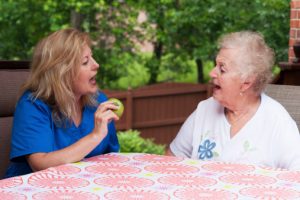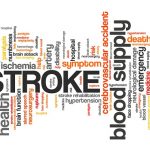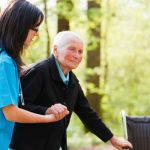 Aphasia is a condition that occurs post-stroke and results in a loss of speech. Research suggests that it can be compensated for by the right side of the brain. Previous research suggested that the right side of the brain actually interfered with recovery post-stroke, but the new findings suggest that the back, right side of the brain can actually aid in speech recovery.
Aphasia is a condition that occurs post-stroke and results in a loss of speech. Research suggests that it can be compensated for by the right side of the brain. Previous research suggested that the right side of the brain actually interfered with recovery post-stroke, but the new findings suggest that the back, right side of the brain can actually aid in speech recovery.
The study examined grey matter volume and its role in speech and how speech can be recovered. The researchers found that patients who regained their voice post-stroke also had more grey matter volume in the back right hemisphere of the brain.
Advertisement
Senior author, Peter Turkeltaub, M.D., Ph.D., said, “Over the past decade, researchers have increasingly suggested that the right hemisphere interferes with good recovery of language after left hemisphere strokes. Our results suggest the opposite – that right hemisphere compensation improves recovery.”
Speech and language loss, known as aphasia, occurs in one-third of stroke patients and they never fully regain it back.
In a group of 32 stroke survivors whose left hemisphere was affected, grey matter volume in the back right hemisphere led to greater success of recovering speech and language. The stroke survivors were compared to 30 other individuals as a control group.
Furthermore, those with recovered speech areas had a larger right hemisphere. Dr. Turkeltaub added, “This indicates growth in these brain areas that relates to better speech production after a stroke.”
Aphasia causes
 Aphasia is caused by brain damage, most commonly a result of stroke. There are four different aphasia types: expressive, receptive, global and nominal. Expressive aphasia is when a person knows what they want to say but are unable to find the words to express themselves. Receptive aphasia is when a person hears someone or reads words but cannot understand what they just heard or read. Global aphasia is when there is widespread damage to language and the person cannot speak or understand language. Lastly, nominal aphasia is when a person cannot use the right terms for objects, people, places or events – this is the least severe form.
Aphasia is caused by brain damage, most commonly a result of stroke. There are four different aphasia types: expressive, receptive, global and nominal. Expressive aphasia is when a person knows what they want to say but are unable to find the words to express themselves. Receptive aphasia is when a person hears someone or reads words but cannot understand what they just heard or read. Global aphasia is when there is widespread damage to language and the person cannot speak or understand language. Lastly, nominal aphasia is when a person cannot use the right terms for objects, people, places or events – this is the least severe form.
Aphasia symptoms
The type of aphasia a person has can determine the symptoms they experience. Common symptoms of aphasia include:
- Speaking in short or incomplete sentences
- Speaking in sentences that don’t make sense
- Substituting one word/sound for another
- Using unrecognizable words
- Not being able to understand other people’s conversation
- Writing sentences that don’t make sense
Aphasia treatment
 If brain damage caused by stroke is mild, language recovery may be possible through speech and language therapy. Therapy is most effective when administered early on – research has supported the idea that speech therapy should occur soon after the brain injury has occurred.
If brain damage caused by stroke is mild, language recovery may be possible through speech and language therapy. Therapy is most effective when administered early on – research has supported the idea that speech therapy should occur soon after the brain injury has occurred.
Therapy may also be effective in group settings, where communication skills can be practiced in a safe environment free of judgment. Also, speech therapy may involve the use of computers to assist in the re-learning of verbs and word sounds.
Lastly, although there are no proven medications that can restore language in aphasia, they continue to be studied.
Related Reading:
Adults with heart defect face higher stroke risk
A new study has found that adults born with a heart defect have an increased risk of experiencing stroke. Senior study author, Dr. Ariane Marelli, said, “We knew there was a connection between heart failure and stroke in patients with heart defects, but we were surprised to discover it was the strongest predictor.” Continue reading…
Advertisement
Stroke survivors face long-term memory loss, cognitive function decline
When blood can’t reach vital organs it can lead to many health consequences. When blood flow is limited in the brain it can result in a stroke. The more the brain goes without the oxygen and nutrients our blood carries, the more likely it will result in permanent brain damage. Continue reading…
Sources:
http://www.sciencedaily.com/releases/2015/11
http://www.stroke.org/we-can-help/survivors/stroke-recovery/post-stroke-conditions/physical/aphasia
http://www.mayoclinic.org/diseases-conditions/aphasia/basics/treatment
